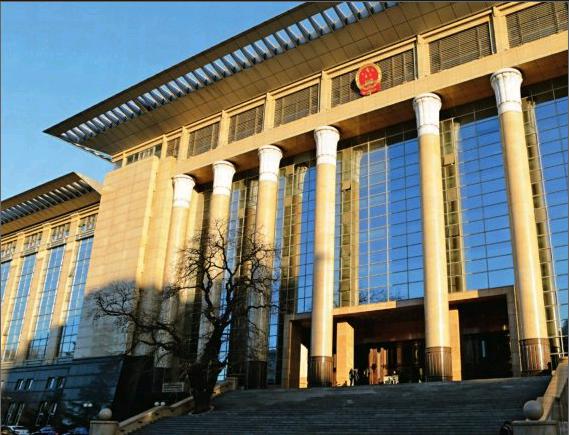Social Equity and Justice via Judicial Reform
By+JIN+SHANMING


AS China undergoes rapid economic and social development and its peoples judicial demands exponentially grow, it becomes more and more important that the population feels proper justice is served in every legal case. This is to be achieved by deepening the reform of the judicial system and enhancing judicial credibility.
Resolved to comprehensively promote the rule of law, China has set the goal of improving the judicial management system and judicial power operating mechanism. The Supreme Peoples Court released last February The Opinion on Comprehensively Deepening the Reform of the Peoples Court (the Opinion) and the 2014-2018 court reform outline, marking the beginning of a new round of judicial reform in China.
Reshape the Concept
For a nation in the midst of transformation, stability and development are the leitmotifs of economic and social life in China. Social and economic development is impossible without good governance, and the judiciary is a key element of the national governance system. The performance of judicial bodies has great bearing on the states governance capacity.
Although the term “rule of law” has been part of the constitution for a long time, what precisely is at its core awaits further exploration. The idea of the rule of law needs full, elaborate and proper definition in order to fill the gaps in peoples understanding of judicial principles and practices, as it is often influenced by cultural traditions.
For instance, some observers maintain that the value of judicial work lies in dispute dissolution. This leads to the excessive pursuit of mediation rates, which skews values and opinions on what is right and wrong, ruins public trust, and shakes peoples faith in the law. Others believe that the value of judicial work lies in maintaining social stability. As long as parties accept the judgment, the judicial mission has been accomplished. Therefore, some local authorities set maintenance of stability as the paramount goal of the judiciary, ignoring true justice, citizenslegitimate rights, and proper procedures mandated by the law.
Of course, some people hold that the value of judicial work consists in achieving social equity and justice. This standpoint gives a positive slant to Chinas judicial work. However, due to differences in the understanding of what is fair and just, certain judges are inept in their interpretation and application of laws, or fail to abide by required procedures, creating a disunion between their self-perception and public evaluation.endprint
Moreover, the thousand-year-long bureaucratic prioritization mindset has been found to be the biggest obstacle to judicial reform. Deep-rooted misconceptions inhibit judicial reform, such as the notion that judicial power is merely one of the governments powers and that the law should give way to political goals.
In addition to ideology, the judicial system itself needs to be improved. For example, the Supreme Peoples Court should enhance its supervision and guidance of the courts at lower levels. The authority of the peoples court should also be further improved. Some unfair judgments, delays to action, and non-uniform standards await further solutions. And harsher punishments should be handed down to those who evade or refuse to implement court orders. Some judges fall short of the requirements of their jobs in the new situation, failing to accurately ascertain facts, correctly apply the law, or properly defuse conflicts. Moreover, along with the increase in cases stemming from the latest develop-ments in Chinese society, pressures on judicial workers is mounting.
In light of these problems, the new round of reform highlights the central status of judicial authority in the execution of public powers, and aims to continually improve judicial credibility to build a socialist judicial system with Chinese characteristics.
Build the Institution
China has been exploring judicial reform for more than two decades, and yet the structure is still incomplete. This round of judicial reform will first make clear its theoretical basis and objectives, and formulate concrete measures to promote reform accordingly.
The subject factor of judicial authority is the judge, whose quality directly determines and influences the results of the judgment. This exerts strong demands on the judges independence and professional ethics. Any factor that may affect a judges independent and fair judgment should be dispelled institutionally. Therefore, to establish a rational and strict system to appoint and evaluate judges is the logical starting point of this judicial reform.
The Opinion pinpoints the path of reform, including differentiated management of court personnel, specifying the number of judges for courts of different levels, reforming judge selection and performance evaluation systems, and enhancing on-the-job training for them. The reform aims to put the judge and the administration of justice at the center of the judicial system, and to build a professional and standard team of judges.endprint
The operating mechanism of judicial authority refers to how judgments are formed, a process that must follow mandated procedures and be transparent throughout. To ensure the independence of the trial and outcome, the Opinion better defines the responsibilities of the presiding judge and collegiate bench. It also clarifies the supervision duties of the court president and presiding judge, improves the working mechanism of the judicial committee, further regulates relations between upper and lower courts, and requires full explanation of the reasons for decisions in written judgments. The ultimate aim is to establish open, dynamic, transparent, and people-friendly adjudication mechanisms, in which the people who handle trials and make decisions have full and clear authority and accountabilities, and are subject to orderly supervision.
The fairness of the judgment depends on the independence of the judge. Being deprived of necessary resources, or being subject to string pulling from certain parties on such matters as promotions, housing, and salary, inevitably prejudices judges impartiality. In response to these problems, the Opinion calls for accelerated reform to the funding system for courts, improved cross-regional jurisdiction, the launch of the circuit court system, deepened reform of the litigation jurisdiction system, reform to the letters and visits system, and strengthening of the supervisory role of the Supreme Peoples Court. These measures are expected to foster the institutional conditions and social atmosphere that promote peoples faith in, and respect and support for the judiciary.
Reform in an Orderly Process
Reform requires not only courage but also a welldesigned schedule. Based on sufficient research and extensive debates, the Opinion articulates 65 concrete measures in seven aspects, with a roadmap for implementation. These are as follows.
By the end of 2015: Build a complete judicial power operation mechanism that features well-defined authorities and accountabilities of judicial personnel, and orderly supervision; build platforms that give the public full information on trial procedures, court decisions and their enforcement, and establish an extensive judiciary service network.
By the end of 2016: Promote a trial-centered litigation system in which investigation and prosecution evolve around the court proceeding; form a scientific, clear, and effective court configuration mode.
By the end of 2017: Form a reasonable, orderly, and impartial judicial jurisdiction system and a sound court personnel management system.
By the end of 2018: Foster the institutional conditions and social atmosphere that promote peoples faith in, and respect and support for the judiciary.
A response to Chinas efforts to advance the rule of law, the Opinion calls the shots for the new round of judicial reform. It is a long and arduous task that in its course maintains peoples rights and interests and defends justice in every case.endprint

